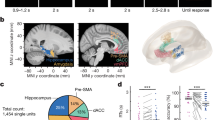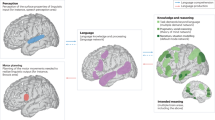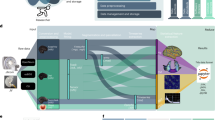Abstract
What is the physiological basis of conscious thought in the mammalian brain ? A model is established of the neural organization underlying this process. It offers an explanation of the “stream of consciousness” and shows how it is possible for the memory trace to be delocalized, although individual memories can be extracted from it.
This is a preview of subscription content, access via your institution
Access options
Subscribe to this journal
Receive 51 print issues and online access
$199.00 per year
only $3.90 per issue
Buy this article
- Purchase on Springer Link
- Instant access to full article PDF
Prices may be subject to local taxes which are calculated during checkout
Similar content being viewed by others
References
Lashley, K. S., Psychol. Rev., 37, 1 (1930).
Beurle, R. L., Phil. Trans. Roy. Soc., B, 240, 55 (1956).
Ashby, W. R., Von Foerster, H., and Walker, C. C., Nature, 196, 561 (1962).
Griffith, J. S., Biophys. J., 3, 299 (1963).
Sherrington, C. S., Man on his Nature (Cambridge University Press, 1940).
Eccles, J. C., The Brain and the Unity of Conscious Experience (Cambridge University Press, 1965).
Sherrington, C. S., The Integrative Action of the Nervous System (Yale University Press, 1906).
Fulton, J. F., Physiology of the Nervous System (Oxford University Press, 1961).
Burns, B. D., and Salmoiraghi, G. C., J. Neurophysiol., 23, 27 (1960).
Rapoport, A., Bull. Math. Biophys., 14, 35 (1952).
Penfield, W., and Jasper, H., Epilepsy and the Functional Anatomy of the Human Brain (J. and A. Churchill, London, 1954).
Hubel, D. H., and Wiesel, T. N., J. Physiol., 160, 106 (1962).
Griffith, J. S., Nature, 211, 1160 (1966).
Russell, W. R., Brain Memory Learning (Oxford University Press, 1959).
Scoville, W. B., and Milner, B., J. Neurol. Neurosurg., 20, 11 (1957).
Lashley, K. S., Brain Mechanisms and Intelligence (Dover Publications, 1963).
Sperry, R. W., Science, 133, 1749 (1961).
Penfield, W., The Excitable Cortex in Conscious Man (Liverpool University Press, 1958).
Sperry, R. W., J. Neurophysiol., 10, 275 (1947).
Sperry, R. W., and Miner, N., J. Comp. Physiol. Psychol., 48, 463 (1955).
Burns, B. D., The Mammalian Cerebral Cortex (Edward Arnold Ltd., London, 1958).
Hebb, D. O., The Organization of Behaviour (Wiley, London, 1949).
Milner, P. M., Psychol. Rev., 64, 242 (1957).
Good, I. J., Adv. in Computers (1965), 6, 31 (1966).
Author information
Authors and Affiliations
Rights and permissions
About this article
Cite this article
GRIFFITH, J. Neural Organization underlying Conscious Thought. Nature 214, 345–349 (1967). https://doi.org/10.1038/214345a0
Received:
Revised:
Issue Date:
DOI: https://doi.org/10.1038/214345a0
Comments
By submitting a comment you agree to abide by our Terms and Community Guidelines. If you find something abusive or that does not comply with our terms or guidelines please flag it as inappropriate.



